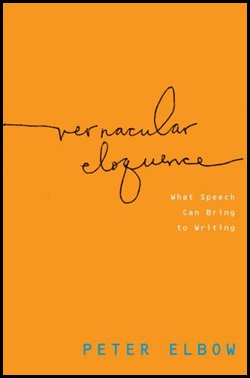VERNACULAR ELOQUENCE
TABLE OF CONTENTS
Acknowledgments xi
Introduction to the Book 3
PART ONE: WHAT'S BEST IN SPEAKING AND WRITING 13
Introduction: "Speech" and "Writing" 13
1 Speaking and Writing as They are Used: The Role of Culture 21
Literacy Story: Three Basic Systems for Written Language 35
2 What's Good about Writing 40
Literacy Story: The Development of Alphabetic Writing in the Middle East 55
3 Speaking as a Process: What Can It Offer Writing? 59
Literacy Story: The Rebus 73
4 Speech as a Product: Nine Virtues in Careless Unplanned Spoken Language that Can Significantly Improve Careful Writing 77
Literacy Story: How We Got Spaces between Our Words 101
5 Intonation: A Virtue for Writing at the Root of Everyday Speech 104
Literacy Story: How Charlemagne and Alcuin Robbed Latin of Its Name 122
6 Can We Really Have the Best of Both Worlds? 124
Literacy Story: Two Stories of How Early Standard English Was Born 135
PART TWO: SPEAKING ONTO THE PAGE: A ROLE FOR THE TONGUT IN THE EARLY STAGES OF WRITING 139
Introduction: Speaking and Writing as Mental Activities, p. 139
7 What Is Speaking onto the Page and How Does Freewriting Teach It? 147
Literacy Story: The Linguistic Brightness of the So-called Dark Ages 165
8 Where Else Do We See Unplanned Speaking onto the Page? 169
Literacy Story: Another Successful Rhetorician in the Court of Queen Isabella 183
9 Considering Objections to Speaking onto the Page 186
Literacy Story: Everyone Complains about Language, but No One Does Anything about It---Except Now and Then 196
10 The Need for Care: Easy Speaking onto the Page Is Never Enough 198
Literacy Story: An Example of a Collage from The New Yorker (July 5, 1982) 211
PART THREE: READING ALOUD TO REVISE: A ROLE FOR THE TONGUE DURING LATE STAGES OF WRITING 213
Introduction: What Is Standard English? 213
11 Revising by Reading Aloud: What the Mouth and Ear Know 219
Literacy Story: Syllabaries and Sequoyah's Invention in Arkansas in 1820 235
12 How Does Revising by Reading Aloud Actually Work? 237
Literacy Story: When They Stopped Teaching Grammar 257
13 Punctuation: Living with Two Traditions 259
Literacy Story: The Rule about That and Which 271
14 Good Enough Punctuation by Careful Reading Aloud and Listening 275
Literacy Story: Languages Dying and Being Reborn 294
15 How Speech Can Improve the Organization of Writing: Form as Energy 299
Literacy Story: Three Countries with Competing Official Written Languages 315
16 Summary Chapter: The Benefits of Speaking onto the Page and Reading Aloud 317
Literacy Story: Chairman Mao Tries to Make Literacy More Available to the Chinese 336
PART FOUR: VERNACULAR LITERACY 341
Introduction: Dante's Vulgar Eloquence 341
Writing and voice 281
17 How Our Culture of Proper Literacy Tries to Exclude Speech 343
Literacy Story: Illegal Alphabets359
18 A New Culture of Vernacular Literacy on the Horizon 363
Appendix I : How Freewriting Went from Dangerous to No Big Deal in the Composition and Rhetoric Community 391
Appendix II : A Sampling of Published Writing in Non-Mainstream Varieties of English 399
Also, Peter Elbow 401
Works Cited 411
Index 429

Oxford University Press, 2012
REVIEWS
"More philosophically rigorous, more historically nuanced, and more socially engaged...and...still delivers the sort of deeply refreshing, commonsensical, practical wisdom about the writing process that has become synonymous with his name." --Rhetoric Review

